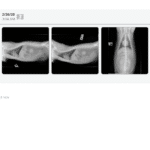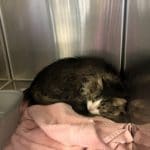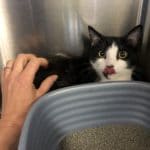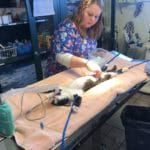Hello,
I think part of the problem is that no one is really sure of his diagnosis. Straining can look like a lot of other things too. I always check the gi system and the urinary system for a cat displaying litter box issues. What that means is that I do a rectal exam. I check the colon the feces (send to the lab) and anal sacs. I also check a urine sample. I even do a urine culture and sensitivity of I can’t find the source of the problem. I think your diet plan is good but I would also encourage play and exercise. It helps the gi system and the weight loss which always helps the urinary system. Think of it like a “whole cat” approach to finding out what is wrong. The other piece of advice I have is to find a feline only practice. I just think they do a better job with cat issues when people feel they haven’t gotten the answers they need at a general vets office. Don’t give up! Your cat is trying to tell you there is a problem. Keep digging! Good luck. Let me know what happens.
So i have a 2 y/o female cat who isnt fixed yet but soon will be. I also have a 2 y/o ferret. They have always gotten along as they both have free range (no one yell about thre ferret having free range please, that isnt the issue and he’s very safe) i found a 4 week old ish kitten about a month ago and decided to keep him. My fear was my cat… but to my surprise she fell head over heels in love with the kitten and now seems to think she’s his mom… that’s being said she cleans him, watches over him, sleeps with him, disciplines him and PROTECTS him… with that being said everytime my kitten and the ferret play she goes aggressively at the ferret and he runs n hides… i feel terrible and have tried to encourage them to play and distract her while they play but she’s relentless. Help!!! All my life ive had different combos of animals and have always found ways to make them get along but im at a loss here… getting her fixed should help this???
Comments
Hi Dr. Mag, Gatsby and I need your help.
I came across some of your videos on YouTube and that brought me to your blogs and finally here to Pawbly.com I feel so fortunate to have found your videos you seem so knowledgeable and more importantly empathetic. The care you have for animals truly shines through. I feel so helpless When it comes to my little guy Gatsby. He is 8 years old and has been very healthy all his life, But within the last six weeks we have been experiencing some urinary issues. I did think he had a blockage because he was unable to urinate for close to 24 hours, he seemed lethargic and did not want to eat. I took him to the vet first thing in the morning and he was given an x-ray which did not show any signs of kidney stones. He was given fluids under the skin, an antibiotic shot and sent home with 5 days dosage of Prozasin. The vet diagnosed him with feline lower urinary tract disease, yet he did not take any urine samples because he said that Gatsby’s bladder was very small and he was unable to collect a sample. He did not take any blood either. Within a couple days Gatsby was again exhibiting the same symptoms so I asked around for personal referrals and took him to a different vet. This vet said the same thing, Gatsby’s bladder was very small, but he kept him for a few hours to collect urine and did perform blood analysis and lab work. This was a Saturday and the vet suggested I switched him to a prescription urinary diet and informed me I would receive lab results that Monday. When the vet called all of his lab work came back clear, no infection, no signs of crystals, no signs of cystitis, kidneys functioning properly and he does not have diabetes. The vet suggested I keep him on a prescription diet and suggested that he lose weight because he is a big boy at 15 pounds. This was about a month ago and Gatsby has had two more episodes since. He is licking himself a lot. He travels to his box many times and is only producing small dots of urine, he has on a handful of occasions exhibited inappropriate urination, but only during these flareups which tend to last 2 to 3 days. I’ve called the vet to discuss Gatsby’s condition and his solution is to have the surgery performed. I have read a lot of literature, watched a lot of videos and have taken him to two different vets to try and find answers and help for him. It hurts me to see him struggling. He is on a wet food only diet, I do not feed him any dry food or dry treats. I have tried a urinary health chew which he receives once a day. I have noticed that he has not been drinking water as he used to prior to these episodes. I have a water fountain for him I’ve tried fresh water in different types of bowls, I’ve tried water with ice, he’s just very resistant to drinking water now. Any advice or guidance you can provide would be greatly appreciated.
Comments
Hi Dr Mag
I noticed alittle over a month ago my cat (Zedicus aka Boo Boo) was sneezing alot and sound like he was snoring when he was up. I took him to his VET where he was diagnosed with polyps. My vet referred me to a specialist for a rhinoscopy. In the process of searching for a reasonable priced specialist. I discovered your youtube page while doing research so I could be better prepared and I had to rush Zed to the ER b/c one night he woke up vomiting up foam. Once we got to the ER he was fine. I had the ER vet take xrays and told them what my Vet said. The Dr vet didnt think it was polyps but perhaps allergies or asthma. She prescribe Clavamox for 2 wks and to revisit the Vet and take another x-ray. The medicine helped the runny nose but nothing else. I’m getting frustrated because I don’t want my cat to suffocate and seems no one really knows what’s wrong with him.
Comments
Hi Dr. Mag, I noticed one of our dogs shaking and scratching at their ear tonight. I looked in the ear and it is red and has dark brown ear wax on the outer ear and smells a little musty and sour. The other ear is normal, no smell and no redness. I removed the wax with cotton but do not have ear cleaner. Would I be able to purchase some cleaner from the vet? Or could you recommend one for purchase? This is for Zoey. Thank you!
Comments
I have a 14 year old female shitzu that has recently been licking her butt a ton. When I try to get close to her rear, she will either turn away from me or run and hide. When i was giving her a bath the other day, when I was trying wash her rear, she yelled. I was able to get a quick look when I was drying her off before she ran from me and there looks to be a white sore on the side of her anus. Would an antibiotic ointment or an antifungal ointment help?
Comments
Good day- We are the proud owners of a one-year-old English Pointer named Bruno and a proud patient of Dr. Magnifico’s. Recently, Bruno has been shaking his head more often and scratching his ears. He has also been sleeping much more the past few days. When not sleeping, he is still pretty playful and eating/drinking. How do you know if he has an ear infection or not? His ears have been professional cleaned, but same actions with his head. Also, no smells coming from his ears. Any suggestions? Thank you.
Comments
My male cat keeps biting and taking chunks of hair out of my female cat who is very fluffy. He plays rough like that with her and I don’t know how to make him stop. She cries and it obviously hurts her having hair ripped out. I yell at him, put him in a separate room but nothing stops it from happening again. They both are fixed and he’s not trying to mount her. He will bite anywhere, tail, leg, side, etc.
Comments
Good afternoon!
I volunteer at a local rescue in their feline only facility. We received a young cat, named Cami, recently that is 9 months old. She has a right head tilt that started about 2 months ago (7 months of age) according to the person who had her since she was a kitten.
A local vet attempted an exam but did not have a scope small enough to look into her ear and the exam became very uncomfortable for Cami. The plan was to get a smaller scope, knock her out and do the exam. Unfortunately, they are unable to acquire the scope at this time. The suspicious is that this is a polyp.
Any ideas what this could be? We are currently wondering if this could be something treatable with medication (to try first) or should we pursue the polyp investigation. Since we are a rescue we are trying to balance the cost but still address Cami’s needs.
Cami shows no distress because of her condition. She does not scratch the ear or shake her head. And is awfully cute!
Thank you, in advance, for any help you can offer!




















Hello,
Spaying might help. Big emphasis on might. I would say this is going to take time and boundaries. There is no other way around it. It is very common for the family dynamics to change with the addition of a new pet. You can try to isolate and spend time independently with everyone. Or try caging the aggressor intermittently to see if that helps de intensify the situation (but better wanted it might make the stress worse). Or find a separate place for your ferret and get him his own friend. Really my biggest concern is the ferrets safety. It will take time to see if they can work it out. But I don’t want to risk him in the process. Whatever the resolution might be I encourage you to stay optimistic. Try not to make matters worse with stress or reprimand (Never ever works on animals!) and just trying lots of options. Like adjusting feeding placement and attention rewards for the food behavior.
Ask your vet for help from a behaviorist. And get the cat spayed. If needed ask the vet about behavior modification assistance. There are lots of options there. Very best of luck!